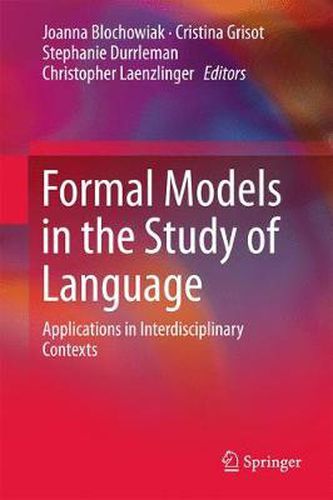Readings Newsletter
Become a Readings Member to make your shopping experience even easier.
Sign in or sign up for free!
You’re not far away from qualifying for FREE standard shipping within Australia
You’ve qualified for FREE standard shipping within Australia
The cart is loading…






This title is printed to order. This book may have been self-published. If so, we cannot guarantee the quality of the content. In the main most books will have gone through the editing process however some may not. We therefore suggest that you be aware of this before ordering this book. If in doubt check either the author or publisher’s details as we are unable to accept any returns unless they are faulty. Please contact us if you have any questions.
This volume presents articles that focus on the application of formal models in the study of language in a variety of innovative ways, and is dedicated to Jacques Moeschler, professor at University of Geneva, to mark the occasion of his 60th birthday. The contributions, by seasoned and budding linguists of all different linguistic backgrounds, reflect Jacques Moeschler’s diverse and visionary research over the years. The book contains three parts. The first part shows how different formal models can be applied to the analysis of such diverse problems as the syntax, semantics and pragmatics of tense, aspect and deictic expressions, syntax and pragmatics of quantifiers and semantics and pragmatics of connectives and negation. The second part presents the application of formal models to the treatment of cognitive issues related to the use of language, and in particular, demonstrating cognitive accounts of different types of human interactions, the context in utterance interpretation (salience, inferential comprehension processes), figurative uses of language (irony pretence), the role of syntax in Theory of Mind in autism and the analysis of the aesthetics of nature. Finally, the third part addresses computational and corpus-based approaches to natural language for investigating language variation, language universals and discourse related issues. This volume will be of great interest to syntacticians, pragmaticians, computer scientists, semanticians and psycholinguists.
$9.00 standard shipping within Australia
FREE standard shipping within Australia for orders over $100.00
Express & International shipping calculated at checkout
This title is printed to order. This book may have been self-published. If so, we cannot guarantee the quality of the content. In the main most books will have gone through the editing process however some may not. We therefore suggest that you be aware of this before ordering this book. If in doubt check either the author or publisher’s details as we are unable to accept any returns unless they are faulty. Please contact us if you have any questions.
This volume presents articles that focus on the application of formal models in the study of language in a variety of innovative ways, and is dedicated to Jacques Moeschler, professor at University of Geneva, to mark the occasion of his 60th birthday. The contributions, by seasoned and budding linguists of all different linguistic backgrounds, reflect Jacques Moeschler’s diverse and visionary research over the years. The book contains three parts. The first part shows how different formal models can be applied to the analysis of such diverse problems as the syntax, semantics and pragmatics of tense, aspect and deictic expressions, syntax and pragmatics of quantifiers and semantics and pragmatics of connectives and negation. The second part presents the application of formal models to the treatment of cognitive issues related to the use of language, and in particular, demonstrating cognitive accounts of different types of human interactions, the context in utterance interpretation (salience, inferential comprehension processes), figurative uses of language (irony pretence), the role of syntax in Theory of Mind in autism and the analysis of the aesthetics of nature. Finally, the third part addresses computational and corpus-based approaches to natural language for investigating language variation, language universals and discourse related issues. This volume will be of great interest to syntacticians, pragmaticians, computer scientists, semanticians and psycholinguists.